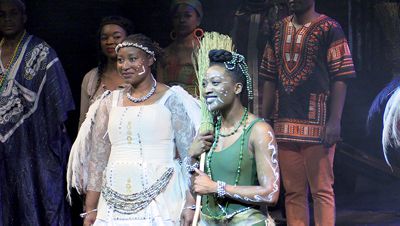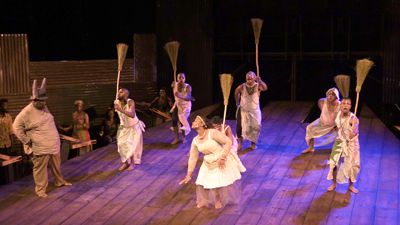Opera
Based on the opera A Midsummer Night’s Dream
by Benjamin Britten
Adapted and directed by Mark Dornford-May
Music Arranged by Mandisi Dyantiyis
Music Directors Pauline Malefane and Mandisi Dyantyis
Choreography Lungelo Ngamlana
Lighting Chloe Kemward
Isango Ensemble
Arts Emerson
Cutler Majestic Theater
Theater district, Boston
November 10-22, 2015
With Noluthando Boqwana, Mandisi Dyantyis, Thobile Dyasi, Ayanda Eleki, Zamile Gantana, Nontsusa Louw, Sifiso Lupuzi, Pauline Malefane, Bongiew Mapassa, Zanele Mbatha, Siyasanga Mbuyazwe, Sinethemba Mdena, Vancia Mgugunyeka, Snadile Mgugunyeka, Katlego Mmusi, Mhlekazi (Whawha) Mosiea, Zoleka Mpotsha, Siyanda Mcobo, Buisiwe Ngejane, Zolina Ngejane, Sonwabo Ntshata, John Page, Tukela Pepeteka, Luvo Rasemeni, Maris Sharp, Masakane Soyayisi, Ayanda Tikolo

in “A Midsummer Night’s Dream”
Photo: Courtesy of ArtsEmerson
The story is just the same as Shakespeare’s play: the king and queen of the fairies get involved in manipulating the affections of four lovers who need some straight settling their allegiances. Along the way, a weaver gets turned into a donkey, various love philters get spread around, and affections go every which way until things finally get straightened out.
I saw and heard Isango Ensemble’s The Magic Flute last year and loved it. To hear all the familiar melodies rapped out on the marimbas and watch the action unfold with the use of African dance techniques, was just great.
Britten’s work is quite different from Mozart’s and though the text of the opera is light, based on Shakespeare’s comedy, the general tenor of the music is generally far less full of recognizable melodies. As a result, with the application of the African musical context and language, the effect is quite a bit more confusing to follow than was the Mozart.

in “A Midsummer Night’s Dream”
Photo: Courtesy of ArtsEmerson
There are some fine performances here – certainly rich voices and lively movement and dancing, but the overall result is more muted, more subdued, and less penetrating than the Mozart was.
Since so much of the singing is in South African tribal languages (Xhosa, Tswana and Zulu?), it would have been helpful to have some kind of supertitles to explain what was going on. There is interspersed English as well, but it is more episodic than the tribal languages and does not serve to convey the story well. One really needs to have carefully studied the precis in the program to get a sense of what’s happening.
Though an interesting project, with certainly some payoffs, the result here is a bit less energetic than one might have expected. Also running at ArtsEmerson over the next week, Isango’s uCarmen, based on Bizet’s Carmen, has a bit more pizzazz.
– BADMan
Leave a Reply